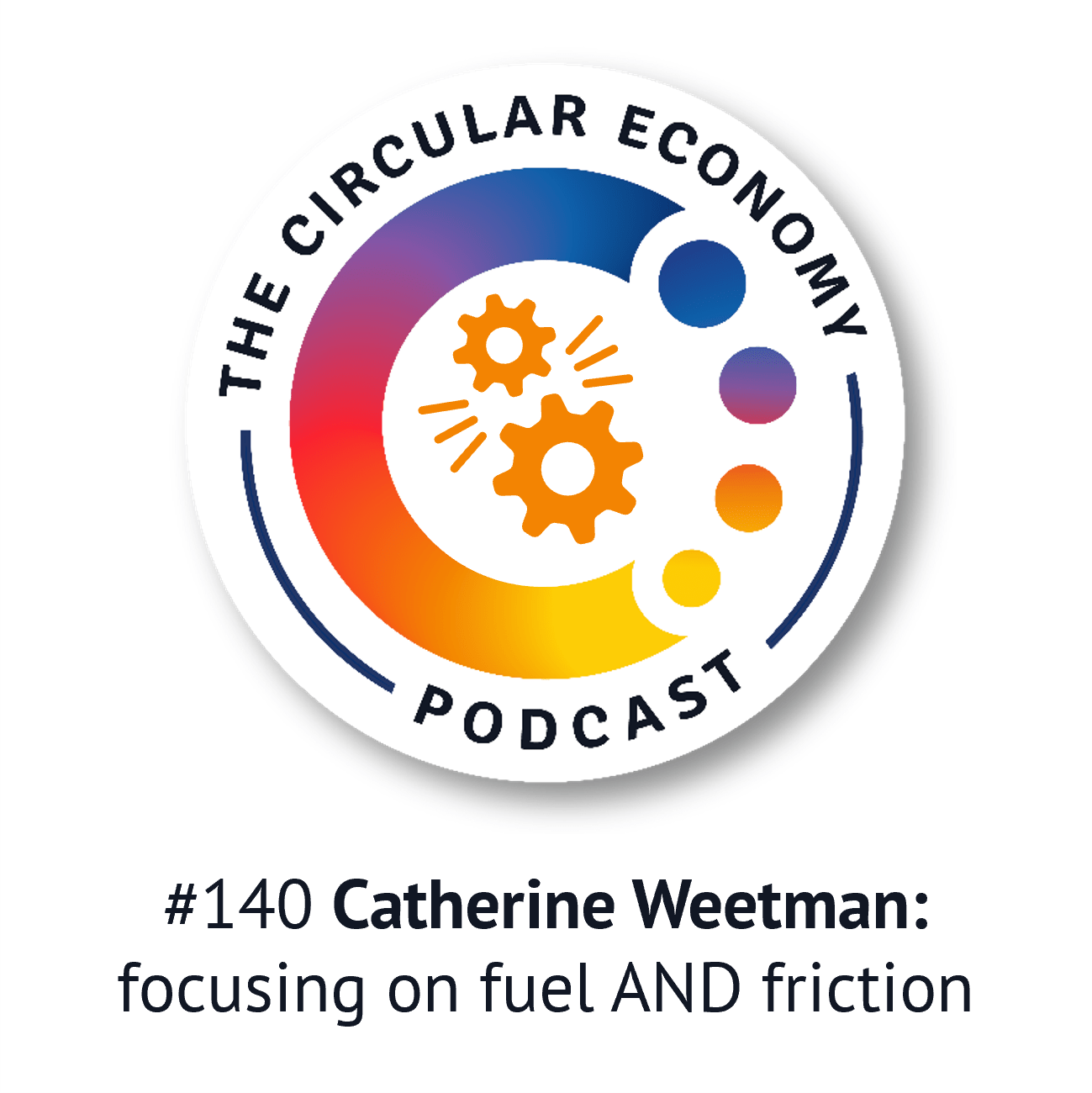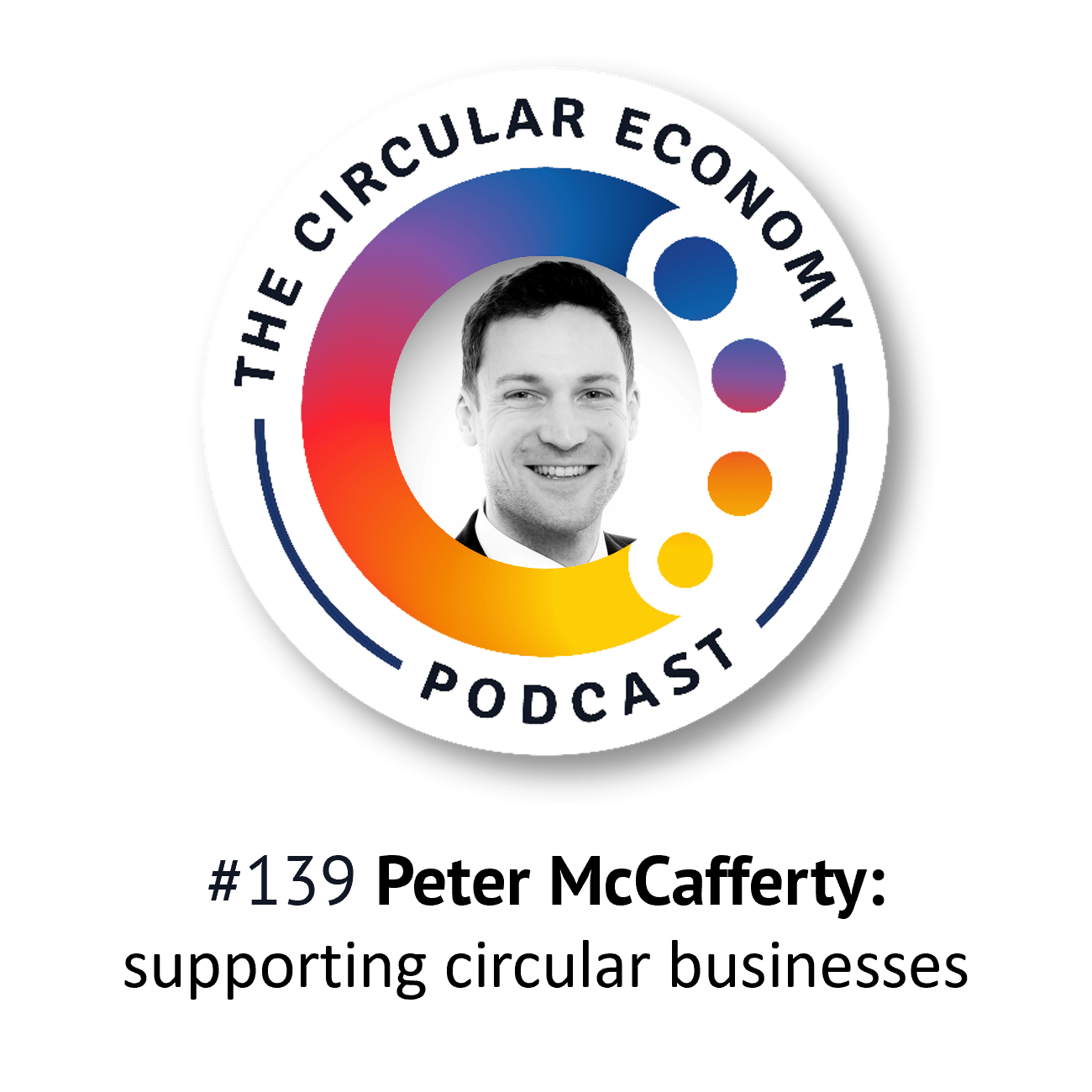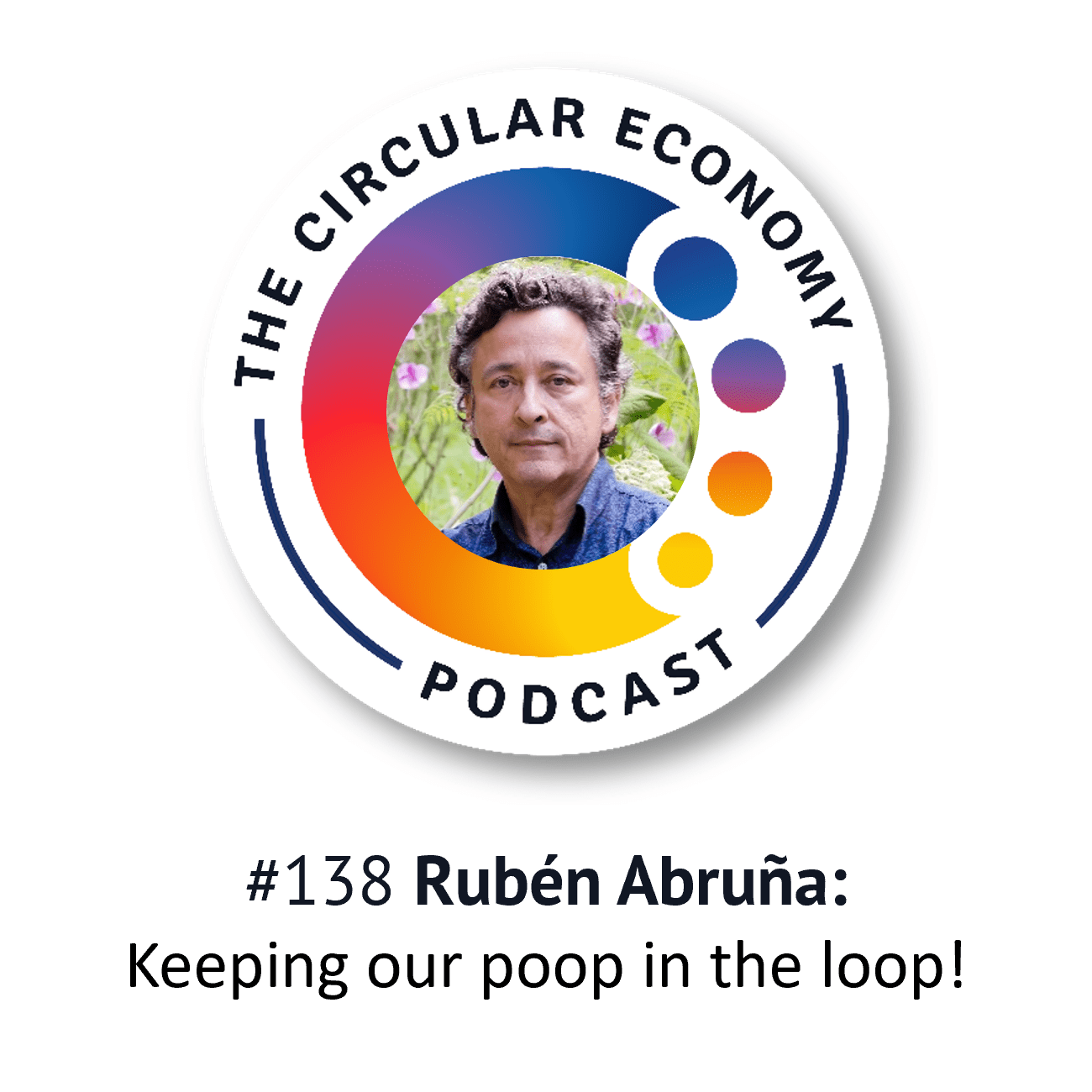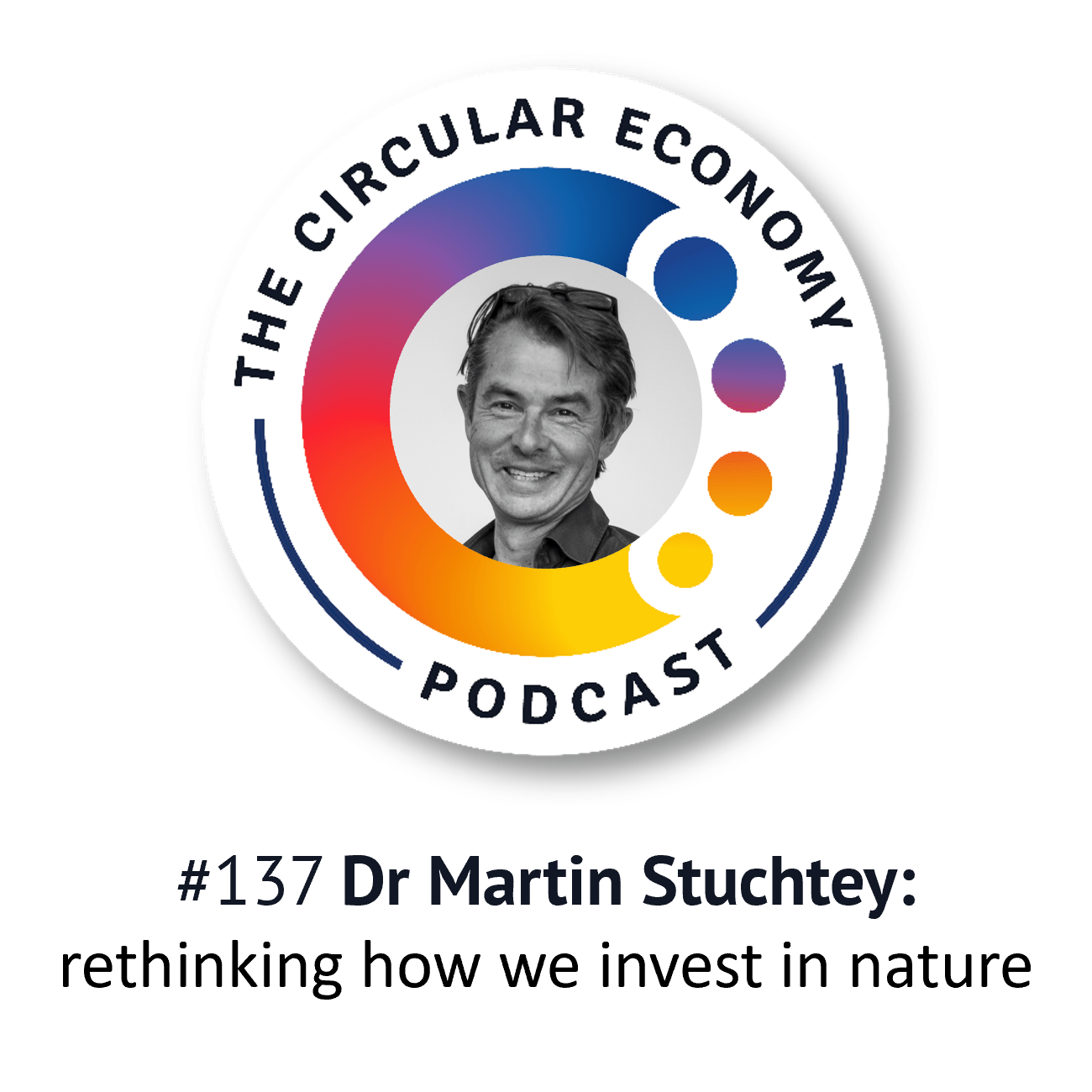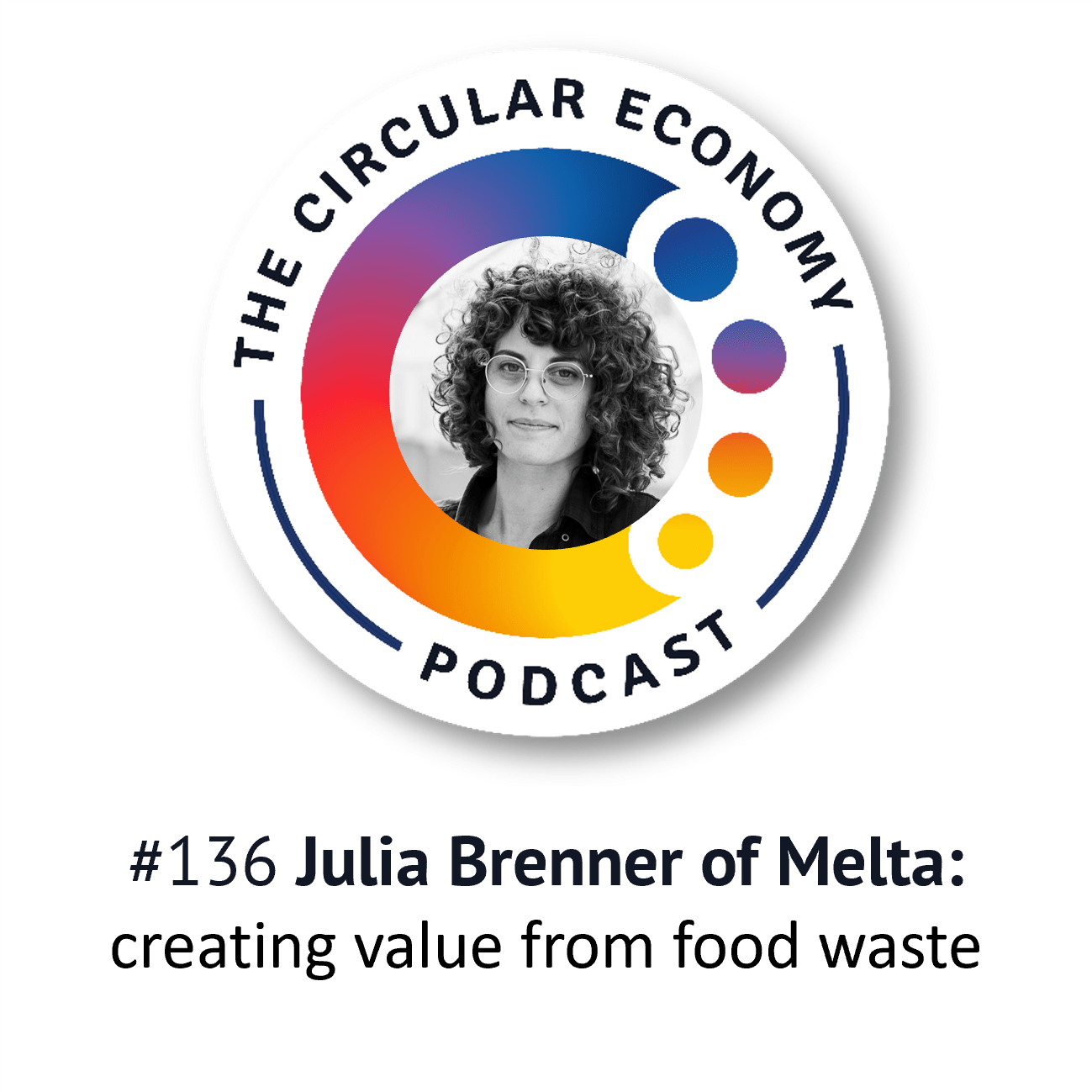Podcast: Play in new window | Download
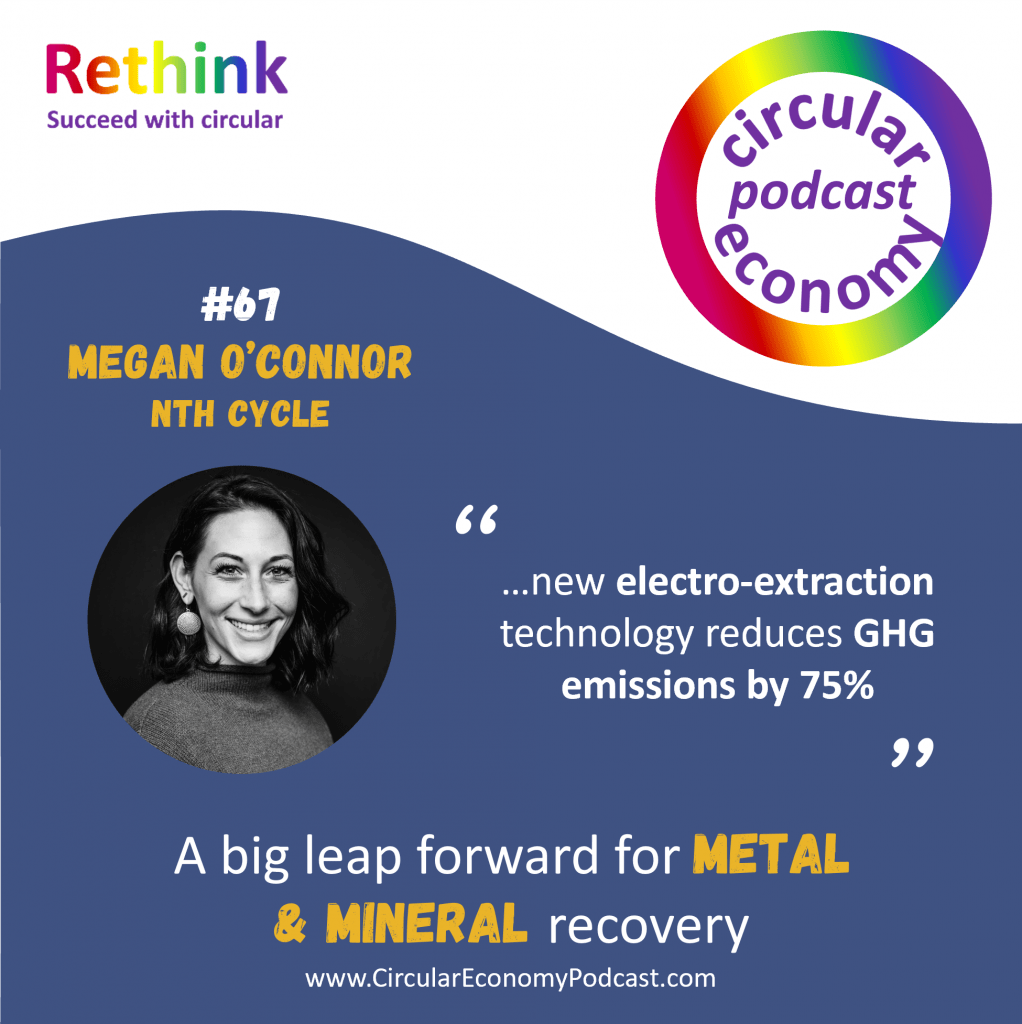
Dr Megan O’Connor is the co-founder and CEO of Nth Cycle, a metal processing company that has developed technology to enable a clean, local, and streamlined supply of critical minerals for the clean energy transition.
We hear how Dr. O’Connor begged her professors at Yale to let her attend the Green Electronics Summit, where she heard big tech brands and manufacturers talk about all the risks and pain points they were up against as they tried to respond to increasing demand for tech, whilst reducing their footprints and improving sustainability.
The quantities of materials we need are mindblowing –for cobalt alone, Megan quotes figures of a 50% supply shortage by 2030.
Basically, we’ve found, and mined, all the easy-to-access sources of many materials, so we’re getting less of each metal or mineral from the same amount of base material. In the shownotes, I’ve included a link to a report from the United Nations Int’l Resource Panel – Decoupling II – which highlighted these issues back in 2014. The report shows that for many minerals, to get the same quantity of metal extraction as a century ago, we now have to process about three times as much material. And of course, that brings associated increases in fossil fuel energy use, land disruption, chemical release and impacts on groundwater and freshwater.
Megan tells us how she came up with the idea for using electro-extraction, a technology developed by her co-founder for a completely different application, and how she then pivoted the entire focus of her PhD to develop this.
We hear about the different challenges in recovering metals from waste, and how the Nth Cycle technology solves these challenges in a more efficient and sustainable way than other recycling methods, such as hydro and pyrometallurgy.
Megan talks us through the range of applications, from e-waste to mining, and how the Nth Cycle technology is developed to be suitable for smaller-scale applications.
Podcast host Catherine Weetman is a circular economy business advisor, workshop facilitator, speaker and writer. Her award-winning book: A Circular Economy Handbook: How to Build a More Resilient, Competitive and Sustainable Business includes lots of practical examples and tips on getting started. Catherine founded Rethink Global in 2013, to help businesses use circular, sustainable approaches to build a better business (and a better world).
Stay in touch for free insights and updates…
Don’t forget, you can subscribe to the podcast series on iTunes, Google Podcasts, PlayerFM, Spotify, TuneIn, or search for “circular economy” in your favourite podcast app. Stay in touch to get free insights and updates, direct to your inbox…
You can also use our interactive, searchable podcast index to find episodes by sector, by region or by circular strategy. Plus, there is now a regular Circular Economy Podcast newsletter, so you get the latest episode show notes and links delivered to your inbox on Sunday morning, each fortnight. The newsletter includes a link to the episode page on our website, with an audio player. You can subscribe by clicking this link to update your preferences.
Links we mention in the episode:
- A Circular Economy Handbook: How to Build a More Resilient, Competitive and Sustainable Business – buy from any good bookseller, or direct from the publisher Kogan Page, which ships worldwide (free shipping to UK and US) and you can use discount code CIRCL20 to get 20% off: https://www.koganpage.com/CircEcon2 It’s available in paperback, ebook and on Kindle. If you buy it from online sources, make sure you choose the new edition with an orange cover!
- Search for episodes by sector, circular economy strategy, person or organisation, using the interactive episode index on our website
- Sign up to get the podcast player and shownotes for each new episode emailed to your inbox
- Nth Cycle website: https://nthcycle.com/
- Nth Cycle on LinkedIn: https://www.linkedin.com/company/nth-cycle and Megan O’Connor https://www.linkedin.com/in/megan-o-connor-193ab0112
- Twitter: @NthCycle
- United Nations Int’l Resource Panel – Decoupling II (2014) – see Full Report, page 31 https://www.resourcepanel.org/reports/decoupling-2
About Megan O’Connor
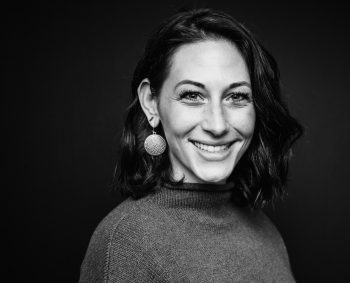
Megan O’Connor is co-founder and CEO of Nth Cycle, a metal processing company that has developed technology to enable a clean, domestic, and streamlined supply of critical minerals for the clean energy transition.
Dr. O’Connor leverages years of experience working on sustainable technology in many of America’s top research labs, where she helped develop the electro-extraction processes she and her team are commercializing at Nth Cycle.
Prior to founding Nth Cycle, Dr. O’Connor was an Entrepreneurial Fellow in the Innovation Crossroads program at Oak Ridge National Laboratory and was a visiting researcher at Yale University’s Center for Green Chemistry & Green Engineering.
Dr. O’Connor received her PhD in environmental engineering from Duke University and was recognized by Forbes on its “30 under 30” energy list in 2019.
Nth Cycle is based in Boston, Massachusetts, and is supported by a world-class team of investors including Clean Energy Ventures, the Department of Energy, and Creative Destruction Lab.
Interview Transcript
Provided by AI – add ~2:30 mins for the finished episode
Catherine Weetman 01:05
Dr Megan O’Connor is the founder and CEO of Nth Cycle, a company that’s developed and deployed an electrode extraction technology to recover critical materials from battery waste. Megan built up years of experience working on sustainable technology in many of America’s top research labs, where she helped develop the electrode extraction processes that she and her team are now commercialising at Nth Cycle. Megan, welcome to the circular economy podcast.
Megan O’Connor, Nth Cycle 01:34
Thank you, Catherine. I’m very excited to be here today.
Catherine Weetman 01:37
Yeah, and I’m really looking forward to this I was blown away to use the colloquial term when I was reading about Nth Cycle and what you’ve been able to develop. And when we when we chatted before you were telling me about the backstory to this and and how you came to do this. So maybe you could share a bit of that with us and explain what and cycle does.
Megan O’Connor, Nth Cycle 02:03
Absolutely, I’m happy to. So Nth Cycle’s overall mission is to create a very sustainable, efficient supply of all critical minerals that are needed for the energy transition. And we’ve developed, as you mentioned before, a new technology called electro extraction, which is really an alternative or replacement to the very antiquated refining technologies that we use today called Hydro and pyrometallurgy. And my co founders and I originally developed this technology over 10 years ago. So my co founder, Chad Vecitis, was a full time professor at Harvard University. And he actually developed this technology for a completely different application in wastewater treatment. I met him in 2014, I saw him give a presentation on this and around the same time is when I really started to become passionate about the circular economy and metals recycling. And, you know, my passion really expanded from there, when I was able to attend this summit called the green electronics summit when I was up at Yale University. And a professor had invited, you know, some of the folks from Apple, Dell, Intel, Samsung, at the the major electronics manufacturers and semiconductor manufacturers you can think of around the world, they were invited to Yale to talk about the major sustainability issues they saw coming over the next five to 10 years, you know, with their corporate hats on. And this was really to help Yale, direct all the research and you know, it wasn’t open to students, it wasn’t even open to other faculty, but I, you know, knew I had to be in in this session to really hear you know, what the real industrial problems were, because that’s originally why I wanted to go to graduate school. And so I begged my way. And it took me about three weeks to convince the professor that I should be in this meeting. So he finally led me in as a scribe to take notes. And it was amazing, just being like a fly on the wall and listening to all of these, you know, corporate folks talk about, you know, recycling, right, recycling kept coming up over and over again, waste management was an issue, they knew it was going to continue to be an issue as more folks get new phones every year, and TVs come out and right, it’s just a larger form of electronics waste, which a lot of people don’t necessarily think of them in that way. And paired with that, you know, waste management issue, no current recycling technologies was the issue that we have with the critical minerals supply chain, right, everybody saw the shortage of cobalt and nickel and rare earth metals coming down the pipeline. You know, by 2030, there’s predicted to be a 50% supply shortage for cobalt alone. And so they were thinking, how are we going to, you know, both recycle these materials in an efficient way. And while also creating a new supply of these materials, enough so that we don’t have to slow down in terms of our development for the clean energy economy. And so I walked out of that meeting and really thought, you know, I think I could try and at least develop a technology to solve this issue. You know, can we create a very economical way to pull these materials out in a form that can be simply put back into the supply chain to create that secondary source that was sort of the other pain point they discussed. And so that’s what I decided to do for the rest of my PhD work. Again, I had met my co founder Chad Vecitis, and asked him if I could use the technology and ‘spin it’ for metals recycling. And he agreed. And you know, we spent the next three years developing it. In about the day after I graduated, we started Nth Cycle we actually sat down at a bar in Boston and had a beer and you know, decided to go for it. And we’ve been trying to develop and commercialise it ever since.
Catherine Weetman 05:20
Wow, what a story and you kind of pivoted your entire PhD, didn’t you towards that you’d already been working on something else and decided that this was so important that that you had to refocus.
Megan O’Connor, Nth Cycle 05:33
I did Yes, in my third year, which a lot of people thought I was crazy, but I really saw a need and thought we could really develop a great solution. Because this would be, you know, a growing problem. And, you know, here we are today where, you know, a lot of the government’s both in Europe and in North America are really, really focused on this. So
Catherine Weetman 05:51
yeah. So you started the business the day after the PhD finished. So no time for rest and recovery. And now it’s it’s developing fast in in a few different ways, isn’t it? Maybe you could explain how it works, what different types of customers because there are at least two distinct groups of customers and and what you actually provide for your customer base.
Megan O’Connor, Nth Cycle 06:18
Absolutely. So at a high level, you can think of the electrode extraction system as an electrified water filter. So a basic water filter you’d see like in a Britta or if you have a pool at home, or well, water, if you think of it that like that, and we figured out a way to electrify it. And by electrifying it with different voltages, we can actually select and selectively recover these different materials based on that voltage that we apply. And so that’s how we’re able to collect and recover these cobalt, nickel and manganese. materials from the batteries and other mines sources that we that we look at very efficiently because our only input is a very low amount of electricity, versus the very high volumes of chemicals that the other technologies I mentioned earlier use the types of customers that we work with, again, we work across the entire supply chain. So we look for this cobalt, nickel, manganese, all these materials and any sort of feedstock, as we like to call them that we can possibly find. So we focus a lot on battery recycling. A lot of folks like to call it urban mining, because there’s a very high content of cobalt and nickel in these devices. And so we work our direct customers are the folks who are collecting these materials, shredding them down into what we call a black mass waste material. And so this is really just a mixture of the cathode and the anode materials that currently end up as a waste product. And so we’re turning that waste product into again, these valuable materials that can go back into the supply chain.
Catherine Weetman 07:42
And you also work with mining companies as well, which sort of feels a bit on circular. But with these particular materials that you’re talking about, often, we don’t have anywhere near enough of them already in the system to be able to recycle them. So although you’re recycling at the one end, there’s such a high demand, as I understand it, for these kind of products, that there’s still a need to mine them. And you help that process become much more efficient and effective, too. Is that right?
Megan O’Connor, Nth Cycle 08:17
That’s right, if we don’t have enough of these materials, specifically for the battery industry, to fully transition from fossil for this, you know, push to electrification that we’re all after. And so once we’re able to get these materials into the supply chain, we can eventually become fully circular. But for now, we really need to start mining more of these materials. And right, all the current mining processes can be quite hazardous. So in cycles, technology can also fit within that space, again, making a much more sustainable, efficient way to pull these materials out. So creating much less waste a much lower carbon footprint, but still providing the critical materials we need for this energy transition.
Catherine Weetman 08:55
Yeah, and that’s so important, isn’t it? It was worth as we’re finding out, there’s a whole whole range of different sectors now all chasing after the same critical materials for their for their technology enablers. So, thinking about the the recyclers that are using this, you know, is it is it complicated or you know, difficult for them to integrate Nth Cycle technology in their process? How does it work for them.
Megan O’Connor, Nth Cycle 09:27
So for them, we wanted to make it as easy as possible to integrate our system right on the end. So a lot of folks in the space are very focused on one of the other pain points, which is collection of these materials. You can imagine that lithium ion batteries, right we all saw the stories of these batteries that can spontaneously combust or start on fire. So you can imagine shipping them very far distances to get them to a recycling centre is very hazardous. They’re in trucks, right in the US here. We can’t even ship them via train anymore because so many explosions happened. And so it’s just very hazardous to move these materials to one centralised place. facility and causes these recyclers to really not have any work to put the materials once they are able to get them. So what we do and what we designed the system to do is go on site. So be very modular go on site be easily integrated into these facilities that are collecting smaller volumes of batteries all across the country, and then process them into a much safer material and much higher value. So they can then ship them to, you know, get back into the actual supply chain.
Catherine Weetman 10:27
Right, so that sounds like you’ve really looked at the different pain points for the whole process from a systems perspective, and try to address as many of those as possible. And going back to something you said at the beginning, about the alternatives, the hydro and the kind of meta logical meta metallurgy over there, I’m not going to get that right. But the the other ways of recycling, you mentioned that those are very energy and or chemical intensive. And I guess that’s something that many people don’t know, we just we just hear about recycling, and we kind of think that’s bound to be a good thing. But when I’ve been looking at, particularly how the circular economy can help with zero carbon ambitions, then you start to read more about recycling and some of the disk benefits. So are you able to unpack that a little bit for us?
Megan O’Connor, Nth Cycle 11:26
Yes, absolutely. You’re right, the the current technologies that are used are for recycling are the same technologies that are used for mining. So you know, you hear all this this negative talk about all the waste that’s produced within the mining process, and it’s very similar in the batteries. But in the in the recycling space, in general, I should say, there’s a lot of harsh chemicals and acids that are used in hydrometallurgy. So that’s a lot of the techniques that are used for things like the battery materials, whether they come out of the ground, from mines, or out of batteries from recycling, as well as pyrometallurgy, which is very large furnaces you can think of so very high temperatures, very high pressures very high in terms of our energy intensity and use for those technologies. And so, you know, if we continue to use those, we’re going to end up causing more harm than good to the planet. But we need these materials, right? So that’s again, where psycho came in and thought, how can we efficiently pull these materials out without, you know, generating, you know, tonnes of waste or, you know, increasing our carbon footprint even more than we already are? And that’s really where electro extraction came in, and can significantly reduce greenhouse gas emissions by 75%. Compared to Hydro and Pyro metallurgy alone,
Catherine Weetman 12:36
wow, that’s a really big benefit, isn’t it? Given given how much of this we need to do?
Megan O’Connor, Nth Cycle 12:42
Exactly, yeah.
Catherine Weetman 12:45
So I think we’ve we’ve we’ve talked a bit about how the business creates value for its customers. Is there anything else that, you know, have we missed anything in terms of great reasons for customers to use Nth Cycle technology?
Megan O’Connor, Nth Cycle 13:03
Yeah, I think in the in the recycling space, as well as the mining space, too. I think one of the other big pain points that Nth Cycle tries to solve is that these feedstocks vary almost every day, you can think of all the different scrap materials that a lot of these recyclers get. And even if they get a consumer electronic phone, which has a battery in it, and an Eevee pack, which also has a battery in it, they’re completely different in terms of the ratios of materials that are in there. And that’s really difficult for existing technologies to handle that day to day variability, even batch to batch within a single day. So Nth Cycle can take all of those different materials and actually process them into a very consistent product, which is very valuable in terms of being able to sell the material, but also in what these recyclers can actually recycle, you know, each and every year. And so that’s a big, a big value that we bring to the market in general. And it’s similar in mining, right, as you as you mentioned earlier, a lot of the the minds are starting to degrade in terms of their value and the grade of materials that you can pull out of there. And so it’s like oh can go in and be able to help with that variability that they see within the ore body itself.
Catherine Weetman 14:08
And I guess, I guess for the mining Are you able to help them recover a wider range of materials than perhaps the primary material that they’ve chosen to source from that particular location?
Megan O’Connor, Nth Cycle 14:21
Absolutely, and that’s it’s critically important for for cobalt especially. And cobalt is considered with a with a, say, a ‘daughter’ metal, so you can’t just go out and find a cobalt or it is generally tied to copper. And a lot of the mines have a really difficult time extracting the cobalt away from the copper. And that’s what Nth Cycle can help with is when you get to those really, really low grades of copper, there’s even lower grades of cobalt in there. And we that’s really where we shine is in those lower grades of materials, especially that we have here within North America to try again to try and pull those materials out, separate them more efficiently and get them into the supply chain.
Catherine Weetman 14:56
So does that mean that you might be able to use the technology And existing mine tailings where it wasn’t possible in the past to extract those materials.
Megan O’Connor, Nth Cycle 15:07
Absolutely, absolutely. That is also a big focus for us is actually going after the waste that was produced from mines. And like you said they weren’t able to, to recover a lot of those materials with the earlier technology that they use to now we can go in and extract, you know, it could be up to 30% of viable material that’s sitting in these waste ponds. And so that’s a lot of value that we can extract.
Catherine Weetman 15:28
Wow, that’s incredible. Incredible. I can imagine if you’re in an awful lot of of demand as people start to hear about this, because it’s absolutely has, you know, transformative potential, isn’t it?
Megan O’Connor, Nth Cycle 15:43
Yes, exactly.
Catherine Weetman 15:45
So Megan, looking back on the on the few years of, you know, going from zero, and then I get into where you are now, what have you struggled with and what surprised you in the process of building Nth Cycle.
Megan O’Connor, Nth Cycle 16:04
As a first time founder, I think every day has been a new adventure and, you know, surprises left and right. But the I think the biggest challenge that we had was really in the stage where, you know, we were not quite at the bench scale, not quite at the commercial scale, right in that sort of mid pilot scale, really getting the talent and the experience that we needed to truly bring it to the commercial scale. And we were really, really lucky to find our VP of operations, his name is Shawn Montgomery. So finding him and using his experience in scaling, bench scale technologies to the actual commercial fields, you know, was a game changer for us. And so really building out the team, I think was, was a great experience. And it was something that really helped us move much faster in the market. And then I’ll say fundraising, too, right? I think you hear a lot of founders say fundraising is always a challenge. But I think recently, we’ve seen a lot of movement in the hardware space, right? I think software has always had a lot of funding, especially right, you hear about Silicon Valley, and the hardware is a little bit different in the clean tech space. But in recent years, I think a lot of folks have seen the value and the need for technologies like ours. And so there’s been more and more you know, VCs and other private funders come into the market to try and, you know, fund these earlier stage technologies. And so that was a big challenge early on. And you know, we’re excited that we’ve overcome that and have reached a point where, you know, we have a great couple of firms backing us.
Catherine Weetman 17:27
And it sounds as though with things like the, you know, the modular design, making it easier for people to put on their own sites without big disruption or reconfiguration, then not only is that a circular principle, you know, kind of making things modular, so it’s easy to instal them, upgrade them, repair them and so on. But of course, it makes it easier to scale and an introduce the technology to more and more customers without a big hassle. Absolutely, yeah. And so, thinking about other businesses, looking at going circular or looking at starting something circular, are there any particular lessons learned or top tips that you’d share?
Megan O’Connor, Nth Cycle 18:10
I would say you know, find the right you know, folks to surround yourself with find the right whether it’s you know, funders or government agencies, right there’s a lot of people who are very interested in this topic now. And I think it’s, there’s a big push to to create this, you know, circularity within as many industries as possible, because it is so critical in our, you know, zero carbon goals over the next several years. And so when you find these people, right, they will be your true champions and help you through a lot of the obstacles that young companies do if you’re young or old. Or more established, I should say, you know, these folks were really help push you and get you through some of those tough times when you might, you know, stumble upon folks who don’t believe that, you know, circular economy will be a thing of the future. So I would say, you know, find your champions in the industry and you know, you’ll be able to find the, you know, the customers and the people to adopt technology from there.
Catherine Weetman 19:02
Hmm, yeah, Climate KIC have a phrase for that the the innovation ecosystem, you know, making sure that you set that up around around your business, looking at who else is in, in the supply chain, and who can can help you. And, and Megan, on a more personal note, other is the one of your values that you think helps to move us towards a battle better world, and that you that you’d like other people to consider.
Megan O’Connor, Nth Cycle 19:35
I say this, I think on a daily basis, to my employees, to my investors to you know, anyone who I speak to, I think transparency is is, is a very, very big deal, especially when you think about circular economy, we need to know you know, what’s in the materials, we’ll never be able to recycle them. We need to know you know, what’s being recycled, or we’re never be able to put it back into the manufacturing supply chain. And I think that sort of trickles down even into our company values where You know, if you can’t be transparent with what you’re doing and why you’re doing it, you know, you need to be more open and honest, and start to have that dialogue. And because I think transparency within the supply chain is going to be, you know, the way that we move forward. And so I think that one of the things I would leave behind is, you know, try to be more transparent, you know, in your personal life as well as within your business, because, you know, we need to know where these materials are, how we’re going to get them out, and how we’re going to put them back into supply chain to truly make it circular, right, we can’t continue to keep all these things private. Or we will never, you know, make the progress we need to become fully circular.
Catherine Weetman 20:35
Yeah, I agree. And I think that that applies on two fronts, doesn’t it kind of, you know, sharing, sharing what you learn and bringing other companies along with you, which is one of the things that Patagonia like to do and try and try and build critical mass behind the things that are difficult. And of course, obviously be honest about what you’re able to do that’s good and you know, maybe barriers that you’ve come up against, and we see so often reputation damage when companies are sweeping things under the carpet or greenwashing or whatever, it’s it’s becoming more and more of a thing, isn’t it with social media news travels ever faster? Hmm,
Megan O’Connor, Nth Cycle 21:14
exactly.
Catherine Weetman 21:15
So Megan, thinking about other circular economy examples that have inspired you Is there anything you’d like to share or somebody you’d like to recommend as a future guest for the podcast
Megan O’Connor, Nth Cycle 21:27
there’s so many i think i mean if we think about sort of big at least in our in our world big corporations that are trying to do this right Apple Dell right the big electronics manufacturers always come to the top right i think they’re they’re truly leading the way I know Tesla’s doing this as well. You know, I think a lot of these companies are really pushing at least the entire industry forward in terms of you know, transparency circular economy wanting and promising that they’re going to recycle 100% of their materials by x date right i think they’re also a different in terms of their goals but you know, they see the value in doing this they see the value in not only vertically integrating but truly finding the sustainable supply that they need and you know, that inspires us everyday right they could be potential future customers of ours but even if they’re not right, they’re truly on a great mission to try and try and vertically integrate and bring you know not only sustainable materials but also reuse a lot of the materials that they put into their phones laptops, cars, movies, you know, whatever they produce and so you know, we really look up to them and you know, hope that they continue to have that leadership within the space because I think everyone will start to follow suit.
Catherine Weetman 22:35
Yeah, I think I was pleasantly surprised when I was researching what Apple were doing for the second edition of the of the book, I knew I’d got a few links stored up but I was kind of expecting most of it to be very superficial, but it was obvious that they had made a lot of progress I guess where it would be great to see Apple leading is on creating modular, you know that the repair abilities got better but why not modular? Why not upgradable rather than this you know, forever planned obsolescence strategy Yeah, it’s not good and even though they sell pre used kits on on the apple website with a guarantee that’s the same as the new one which is only a year isn’t doesn’t seem all that good, the transparency there about the difference between the pre used model and it’s you know which processor or which which can’t remember Apple’s term for it but the kind of you know, that the software release which one that is versus the newest one is a lot less than transparent and you know, it would be good to kind of see here Here are four options and you know, the, the the current model might cost 80% of a new one but the but the one that’s three or four models out of date, you know, it’s only 20% or something and really create a market for pre used kit that people know to be reliable and and useful. Yeah, I
Megan O’Connor, Nth Cycle 24:09
couldn’t agree more planned obsolescence is horrible. Especially you know, in the track we’ve taken to say like even a non removable battery, it’s very difficult for recyclers to handle that material so I completely agree with everything you said is we need to be much more transparent and you know, sort of homeschool backwards and making phones easier to disassemble, replace batteries, you know, do all the things that we used to be able to do you know, before you know, the newer generation of phones came out.
Catherine Weetman 24:38
Yeah, exactly. Because when you when you start to look at these things, it’s either impossible to take apart because they’ve made the construction cheaper by glueing and bonding instead of using fixings. Or you might even think that they’ve made it deliberately impossible to get into to stop you being able to repair it and yeah, So for the for the cynics like me, it doesn’t, doesn’t look good. So Megan, how can people find about more, find out more about you and Nth Cycle and get in touch?
Megan O’Connor, Nth Cycle 25:14
Absolutely folks can can find us on our website, it’s www Nth Cycle dot com. Our contact information is on there and we’d love to hear from you. If you have any questions about what we do or know somebody who needs recycling or sustainable mining, we’d love to hear from you to be able to help provide a new solution.
Catherine Weetman 25:32
Yeah, I’m just again, you know, going back to when I first looked at it was just going through the website and thinking wow, this is absolutely transformational. So I’m sure it’ll go from strength to strength and you know, you’ll be helping an awful lot of companies solve big headaches in in multiple areas, because as you mentioned, you’re solving a lot of pain points. And, you know, really, really making a difference. So thanks very much for sharing the story so far, and Nth Cycle and good luck with the next phase and look forward to hearing more in due course. Thanks, Megan.
Megan O’Connor, Nth Cycle 26:10
Thanks, Catherine. Great being here today.
Want to dig deeper?
Why not buy Catherine’s award-winning book, A Circular Economy Handbook: How to Build a More Resilient, Competitive and Sustainable Business. This comprehensive guide uses a bottom-up, practical approach, and includes hundreds of real examples from around the world, to help you really ‘get’ the circular economy. Even better, you’ll be inspired with ideas to make your own business more competitive, resilient and sustainable.
Please let us know what you think of the podcast – and we’d love it if you could leave us a review on iTunes, or wherever you find your podcasts. Or send us an email…
Podcast music
Thanks to Belinda O’Hooley and Heidi Tidow, otherwise known as the brilliant, inventive and generous folk duo, O’Hooley & Tidow for allowing me to use the instrumentals from the live version of Summat’s Brewin’ as music for the podcast. You can find the whole track (inspired by the Copper Family song “Oh Good Ale”) on their album, also called Summat’s Brewin’. Or, follow them on Twitter.
